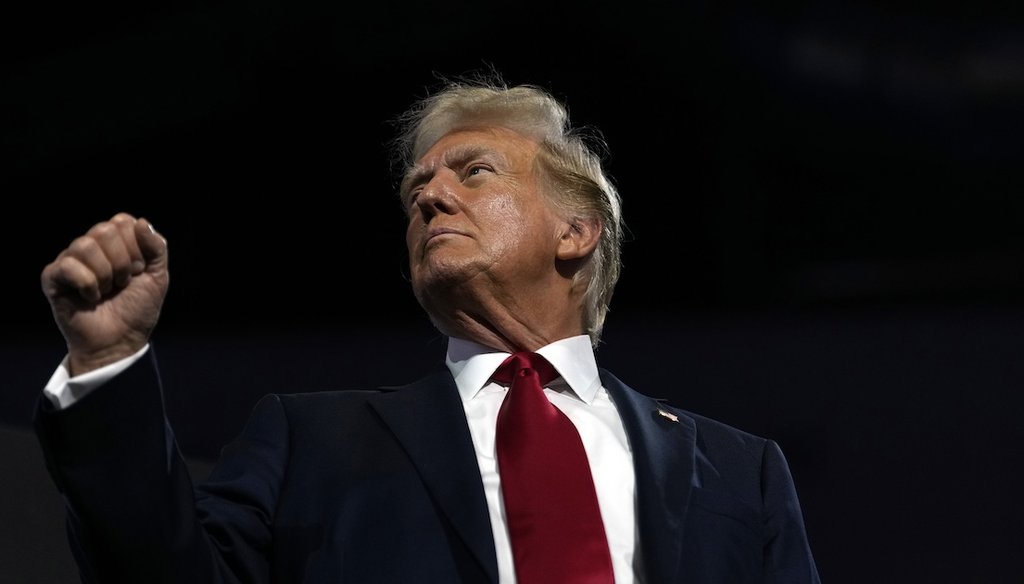Stand up for the facts!
Our only agenda is to publish the truth so you can be an informed participant in democracy.
We need your help.
I would like to contribute

Former President Donald Trump raises his fist July 18, 2024, during his speech the Republican National Convention in Milwaukee. (AP)
If Your Time is short
MILWAUKEE — Former President Donald Trump closed the Republican National Convention by accepting the presidential nomination and offering a speech that began somber and turned combative.
First, he recounted surviving an assassination attempt five days earlier in Butler, Pennsylvania.
"You’ll never hear it from me again a second time, because it’s too painful to tell," Trump told a hushed audience. "I stand before you in this arena only by the grace of Almighty God."
When Trump said, "I'm not supposed to be here tonight," the audience chanted, "Yes you are! Yes you are!" Onstage, Trump kissed the firefighter’s uniform of Corey Comperatore, whom Trump’s would-be assassin killed.
After about 20 minutes, Trump’s speech shifted. He countered Democrats’ claims that he endangers democracy, praised the federal judge who dismissed the classified documents case against him and called the legal charges "partisan witch hunts."
Though he criticized the policies of his opponent, Democratic President Joe Biden, Trump said he’d avoid naming him.
Sign up for PolitiFact texts
Trump occasionally offered conciliatory notes, but more often repeated questionable assertions we’ve repeatedly fact-checked. Here are some.
Immigrants are "coming from prisons, they’re coming from jails, they're coming from mental institutions and insane asylums."
False.
When Trump said earlier this year that Biden is letting in "millions" of immigrants from jails and mental institutions we rated it Pants on Fire. Immigration officials arrested about 103,700 noncitizens with criminal convictions (whether in the U.S. or abroad) from fiscal years 2021 to 2024, federal data shows. That accounts for people stopped at and between ports of entry.
Not everyone was let in. The term "noncitizens" includes people who may have legal immigration status in the U.S., but are not U.S. citizens.
The data reflects the people that the federal government knows about but it’s inexhaustive. Immigration experts said despite those data limitations, there is no evidence to support Trump’s statement. Many people in Latin American countries face barriers to mental health treatment, so if patients are coming to the U.S., they are probably coming from their homes, not psychiatric hospitals.
"Caracas, Venezuela, really dangerous place, but not anymore. Because in Venezuela, crime is down 72%"
Although Venezuelan government data is unreliable, some data from independent organizations shows that violent deaths have recently decreased, but not by 72%. From 2022 to 2023, violent deaths dropped by 25%, according to the independent Venezuelan Observatory of Violence.
Criminologists attribute this decline to Venezuela’s poor economy and the government’s extrajudicial killings. They said there is no evidence that Venezuela’s government is emptying its prisons and sending criminals to the United States.
El Salvador murders are down 70% "because they're sending their murderers to the United States of America."
False.
There has been a significant drop in crime in El Salvador, but it is not because the country is sending prisoners to the U.S.
According to data from El Salvador’s National Police, in 2023, the country reported a 70% drop in homicides compared with 2022, as Trump noted.
But it’s been well reported — by the country’s government, international organizations and news organizations — that El Salvador’s President Nayib Bukele has aggressively cracked down on crime. There is no evidence that Bukele’s effort involves sending prisoners to the U.S.
El Salvador has been under a state of emergency, because of gang violence and high crime rates, since March 2022. On July 10, the Legislative Assembly voted to extend its use.
The order suspends "a range of constitutional rights, including the rights to freedom of association and assembly, to privacy in communications, and to be informed of the reason for arrest, as well as the requirement that anyone be taken before a judge within 72 hours," according a Human Rights Watch report.
The state of emergency has led multiple international human rights groups and governments, including the U.S., to condemn human rights abuses in El Salvador such as arbitrary killings, forced disappearances and torture.
Trump claims Bukele is "sending all of his criminals, his drug dealers, his people that are in jails. He's sending them all to the United States." But El Salvador’s prison population has drastically increased in recent years, according to InSight Crime, a think tank focused on crime and security in the Americas.
In 2020, El Salvador’s prison population stood at around 37,000. In 2023, it was more than 105,000 — around 1.7% of the country’s population, InSight Crime said.
"Behind me and to the right was a large screen that was displaying a chart of border crossings under my leadership, the numbers were absolutely amazing."
As he recounted the story of his attempted assassination, Trump mentioned a chart of illegal border crossings from fiscal year 2012 to 2024. We fact-checked the false and misleading annotations on the chart.
For example, a red arrow on the chart claims to show when "Trump leaves office. Lowest illegal immigration in recorded history." But the arrow points to a decline in immigration encounters at the beginning of the coronavirus pandemic, when migration overall plummeted as nations imposed lockdowns. Trump left office nine months later, when illegal immigration encounters were on the rise.
Later in the RNC speech, Trump said, "Under my presidency, we had the most secure border."
That’s Mostly False. Illegal immigration during Trump’s administration was higher than it was during both of former President Barack Obama’s terms.
Illegal immigration between ports of entry at the U.S. southern border dropped in 2017, Trump’s first year in office, compared with previous years. But illegal immigration began to rise after that. It dropped again when the COVID-19 pandemic started and immigration decreased drastically worldwide.
In the months before Trump left office, as some pandemic travel restrictions eased, illegal immigration was rising again. A spike in migrants, especially unaccompanied minors, started in spring 2020 during the Trump administration and generally continued to climb each month.
It’s difficult to compare pre-COVID-19 data with data since, because of changes in data reporting. But, accounting for challenges in data comparisons, a PolitiFact review found an increase of 300% in illegal immigration from Trump’s first full month in office, February 2017, to his last full month, December 2020.
The jobs that are created under Biden, "107% of those jobs are taken by illegal aliens."
This Republican talking point paints the Biden years as being better for foreign-born workers than native-born Americans. But it is wrong.
Since Biden took office in early 2021, the number of foreign-born Americans who are employed has risen by about 5.6 million. But over the same period, the number of native-born Americans employed has increased by almost 7.4 million.
The unemployment rate for native-born workers under Biden is comparable to what it was during the final two prepandemic years of Trump’s presidency.
Trump: "There's an interesting statistic, the ears are the bloodiest part. If something happens with the ears, they bleed more than any other part of the body."
Mostly True.
Trump said that in reference to the injury he sustained to the top of his right ear during the assassination attempt at his July 13 rally.
Although the ears do bleed heavily, PolitiFact could not identify statistical evidence that they are the "bloodiest part" of the body.
The ear gets most of its blood from a branch of the external carotid artery. An injury to an artery is prone to heavier bleeding, according to a study published in the European Journal of Trauma and Emergency Surgery.
But other parts of the upper body might bleed more from an external injury, doctors said.
"The scalp is perhaps the most ‘bloody’ part of the body if injured or cut," Céline Gounder, a physician, senior fellow at KFF and editor-at-large for public health at KFF Health News, told PolitiFact in an email. "But, in general, the head/neck is the ‘bloodiest’ part of the body. The ear is part of that."
"An injury similar to what Trump sustained to the ear would bleed less if inflicted on a part of the body below the neck," Gounder added. (KFF is the health policy research, polling, and news organization that includes KFF Health News.)
During my presidency, we had "the best economy in the history of our country, in the history of the world. … We had no inflation, soaring incomes."
One of the strongest ways to assess the economy is the unemployment rate, which fell during Trump’s presidency to levels untouched in five decades. But his successor, Joe Biden, matched or exceeded those levels.
Another measure, the annual increases in gross domestic product, were broadly similar under Trump to what they were during the final six years under his predecessor, Barack Obama. And GDP growth under Trump was well below that of previous presidents.
Wage growth increased under Trump, but to say they soared is an exaggeration. Adjusted for inflation, wages began rising during the Obama years and kept increasing under Trump. But these were modest compared with the 2% a year increase seen in the 1960s.
Another metric — the growth rate in personal consumption per person, adjusted for inflation — wasn’t higher under Trump than previous presidents. For many families, this statistic serves an economic activity bottom line, determining how much they can spend on food, clothing, housing, health care and travel.
In Trump’s three years in office through January 2020, real consumption per person grew by 2% a year. Of the 30 nonoverlapping three-year periods from 1929 to the end of his presidency, Trump’s periods ranked in the bottom third.
As for inflation being zero, that’s also wrong. It was low, ranging from 1.8% to 2.4% increases year over year in 2017, 2018 and 2019. This is roughly the range the Federal Reserve likes to see. During the coronavirus pandemic-dominated year of 2020, inflation fell to 1.2%, because demand plummeted as entertainment and travel collapsed.
"Our current administration, groceries are up 57%, gasoline is up 60% and 70%, mortgage rates have quadrupled."
Mostly False.
There is an element of truth, because prices have risen for all of these. But Trump exaggerated the percentages.
The price of groceries has risen by 21.5% in the more than three and a half years since Biden was inaugurated in January 2021.
Gasoline prices are up 55% over the same period.
Mortgage rates haven’t quadrupled. But they have more than doubled, because of Federal Reserve rate increases to curb inflation. The average 30-year fixed- mortgage rate mortgage was 2.73% in January 2021, but 6.89% in July 2024.
"Our crime rate is going up."
He’s wrong on violent crimes, but has a point for some property crimes.
Federal data shows the overall number of violent crimes, including homicide, has declined during Joe Biden’s presidency. Property crimes have risen, mostly because of motor vehicle thefts.
The FBI data shows the overall violent crime rate — which includes homicide, rape, robbery and aggravated assault per 100,000 population — fell by 1.6% from 2021 to 2022, the most recent year with full-year FBI data.
Private sector analyses show continued crime declines. For instance, the Council on Criminal Justice, a nonpartisan think tank, samples reports from law enforcement agencies in several dozen cities to gauge crime data more quickly than the FBI. The council’s data shows the declining violent crime trends continued into 2023.
Property crime has increased under Biden, although three of the four main categories the FBI tracks — larceny, burglary and arson — were at or below their prepandemic level by 2022. The main exception has been motor vehicle theft, which rose 4% from 2020 to 2021 and 10.4% from 2021 to 2022.
The Biden administration is "the only administration that said we're going to raise your taxes by four times what you're paying now."
Biden is proposing a tax increase of roughly 7% over the next decade, not 300%, as Trump claims.
About 83% of the proposed Biden tax increase would be borne by the top 1% of taxpayers, a level that starts at just under $1 million a year in income.
Taxpayers earning up to $60,400 would see their yearly taxes decline on average, and taxpayers earning $60,400 to $107,300 would see an annual increase of $20 on average.
The IRS hired "88,000 agents" to go after Americans.
Mostly False.
The figure, which has been cited as 87,000 in past statements, is related to hires the IRS approved in 2022 that included information technology and taxpayer services, not just enforcement staff. Many of those hires would go toward holding staff numbers steady in the face of a history of budget cuts at the IRS and a wave of projected retirements.
The U.S. Treasury Department previously said that people and small businesses that make less than $400,000 per year would see no change, although audits of corporations and high-net-worth people would rise. House Republicans passed a bill in 2023 to rescind the funding for the hires. Passage by the Democratic Senate majority is unlikely. President Joe Biden has vowed to veto the bill if it reaches his desk.
"Democrats are going to destroy Social Security and Medicare, because all of these people, by the millions, they’re coming in. They’re going to be on Social Security and Medicare and other things, and you’re not able to afford it. They are destroying your Social Security and your Medicare."
Most immigrants in the U.S. illegally are ineligible for Social Security. Some people who entered the U.S. illegally and were granted humanitarian parole — a temporary permission to stay in the country — for more than one year, may be eligible for Social Security for up to seven years, the Congressional Research Service said.
Immigrants in the U.S. illegally also are generally ineligible to enroll in federally funded health care coverage such as Medicare and Medicaid. (Some states provide Medicaid coverage under state-funded programs regardless of immigration status. Immigrants are eligible for emergency Medicaid regardless of status.)
It’s also wrong to say that immigration will destroy Social Security. The program’s fiscal challenges stem from a shortage of workers compared with beneficiaries. Immigrants who are legally qualified can receive Social Security retirement benefits only after they’ve worked and paid Social Security taxes for 10 years. So, for at least 10 years, these immigrants will be paying into the system before they draw any benefits.
Immigration is far from a fiscal fix-all for Social Security’s challenges. But having more immigrants in the United States would increase the worker-to-beneficiary ratio, potentially for decades, thus extending the program’s solvency, economic experts say.
Trump: "They spent $9 billion on eight chargers."
False.
The Bipartisan Infrastructure Law, which Biden signed in November 2021, allocated $7.5 billion to electric vehicle charging. Trump exaggerated the program and charger costs.
The Federal Highway Administration told PolitiFact that as of this April, the infrastructure funding has created seven open charging stations with 29 spots for electric vehicles to charge. They were installed across five states — Hawaii, Maine, New York, Ohio and Pennsylvania — the administration said in a statement.
Transportation Secretary Pete Buttigieg said in a May CBS interview that the Biden administration’s goal is to install 500,000 EV chargers by 2030.
"And the very first handful of chargers are now already being physically built. But again, that's the absolute very, very beginning stages of the construction to come," Buttigieg said.
The cost for equipment and installation of high-speed EV chargers can range from $58,000 to $150,000 per charger, depending on wattage and other factors.
The federally funded EV charging program started slowly. The Energy Department said initial state plans were approved in September 2022. Since April, federally funded charging stations have opened in Rhode Island, Utah and Vermont.
"I will end the electric vehicle mandate on Day 1."
False.
There is no electric vehicle mandate to begin with.
The Biden administration has set a goal — not a mandate — to have electric vehicles comprise half of all new vehicle sales by 2030.
Later in his speech, Trump said: "I am all for electric. … But if somebody wants to buy a gas-powered car… or a hybrid, they are going to be able to do it. And we’re going to make that change on Day 1. " The Biden administration has introduced new regulations on gasoline-powered cars but those policies do not ban gasoline-powered cars. They can continue to be sold, even after 2030.
"Under the Trump administration, just three and a half years ago, we were energy independent."
There are various definitions of "energy independence," but during Trump’s presidency, the U.S. became a net energy exporter and began producing more energy than it consumed. Both milestones hadn’t been achieved in decades.
However, that achievement built on more than a decade of improvements in shale oil and gas production, along with renewable energies. The U.S. also did not achieve net exporter status for crude oil, which produces the type of energy that voters hold politicians most accountable for: gasoline.
Even during a period of greater energy independence, the U.S. energy supply is still sensitive to global developments, experts told PolitiFact in 2023. Because many U.S. refineries cannot process the type of crude oil produced in the U.S., they need to import a different type of oil from overseas to serve the domestic market.
"They used COVID to cheat."
During the pandemic, multiple states altered rules to ease mail-in voting for people concerned about contracting COVID-19 at indoor polling places. Changes included mailing ballots to all registered voters, removing excuse requirements to vote by mail and increasing the number of ballot drop boxes. State officials used legal methods to enact these changes, and the new rules applied to all voters, regardless of party affiliation.
The 2020 election was certified by every state and confirmed by more than 60 court cases nationwide.
During his presidency, we had "the biggest regulation cuts ever."
We tracked Trump’s progress on his campaign promise to "enact a temporary ban on new regulations" and rated that a Compromise.
Near the end of Trump’s presidency, an expert told us that overall the amount of federal regulations was roughly unchanged since Trump took office.
Russia’s war in Ukraine and Hamas’ attack on Israel "would have never happened if I were president."
This is unsubstantiated and ignores the complexities of global conflict. There’s no way to assess whether Russian President Vladimir Putin wouldn’t have invaded Ukraine in February 2022 if Trump were still president, or whether Hamas wouldn’t have attacked Israel in October 2023.
Experts told PolitiFact that there’s a limit to how much influence U.S. presidents have over whether a foreign conflict erupts into war. "American presidents have scant control over foreign decisions about war and peace unless they show their willingness to commit American power," said Richard Betts, a Columbia University professor emeritus of war and peace studies and of international and public affairs.
During the Trump administration, there were no new major overseas wars or invasions. But during his presidency, there were still conflicts within Israel and between Russia and Ukraine. For example, Russia was intervening militarily in the Ukraine’s Donbas region throughout Trump’s administration.
Trump also supported weakening NATO, reducing expectations among allies that the U.S. would intervene militarily if they were attacked.
Although there’s no way to know how the war in Israel would have played out, experts said the prospect of the Abraham Accords — the peace effort between Israel and Arab nations led by the Trump administration — likely helped drive Hamas’ attack.
"There’s no doubt in my mind that the prospect of the Abraham Accords being embraced by countries such as Saudi Arabia was one of the main causes of the Oct. 7 attack," Ambassador Martin Kimani, the executive director of NYU’s Center on International Cooperation said.
When the U.S. withdrew from Afghanistan, we "left behind $85 billion worth of military equipment."
False.
This is an exaggeration. When the Taliban toppled Afghanistan’s civilian government in 2021, it inherited military hardware the U.S. gave it. But the hardware’s value did not amount to $85 billion.
A 2022 independent inspector general report informed Congress that about $7 billion of U.S.-funded equipment remained in Afghanistan and in the Taliban’s hands. According to the report, "The U.S. military removed or destroyed nearly all major equipment used by U.S. troops in Afghanistan throughout the drawdown period in 2021."
We rated a similar claim False in 2021.
When he was president, "Iran was broke."
Iran’s foreign currency reserves fell from $128 billion in 2015 to $15 billion in 2019, a dramatic drop in absolute dollars. The decline is widely believed to be a consequence of the tightened U.S. sanctions under Trump, and although Iran’s foreign currency reserves have grown since then, it's nowhere near pre-2019 levels.
The Federal Reserve Bank of St. Louis pegged Iran’s foreign currency reserves in 2024 around $36 billion.
PolitiFact Chief Correspondent Louis Jacobson, Senior Correspondent Amy Sherman, Staff Writers Kwasi Gyamfi Asiedu, Maria Briceño, Madison Czopek, Marta Campabadal Graus, Ranjan Jindal, Mia Penner, Samantha Putterman, Sara Swann, Loreben Tuquero, Maria Ramirez Uribe, Researcher Caryn Baird, KFF Health News Senior Editor Stephanie Stapleton and KFF Health News Senior Correspondent Stephanie Armour contributed to this story.
Our convention fact-checks rely on both new and previously reported work. We link to past work whenever possible. In some cases, a fact-check rating may be different tonight than in past versions. In those cases, either details of what the candidate said, or how the candidate said it, differed enough that we evaluated it anew.
RELATED: In Context: Trump recounts assassination attempt. Here’s what he said at the RNC
RELATED: A guide to Trump’s 2nd term promises: immigration, economy, foreign policy and more
RELATED: 2024 RNC fact-check: What Trump VP pick JD.Vance got right, wrong in Milwaukee speech
Our Sources
See sources linked in story.





























